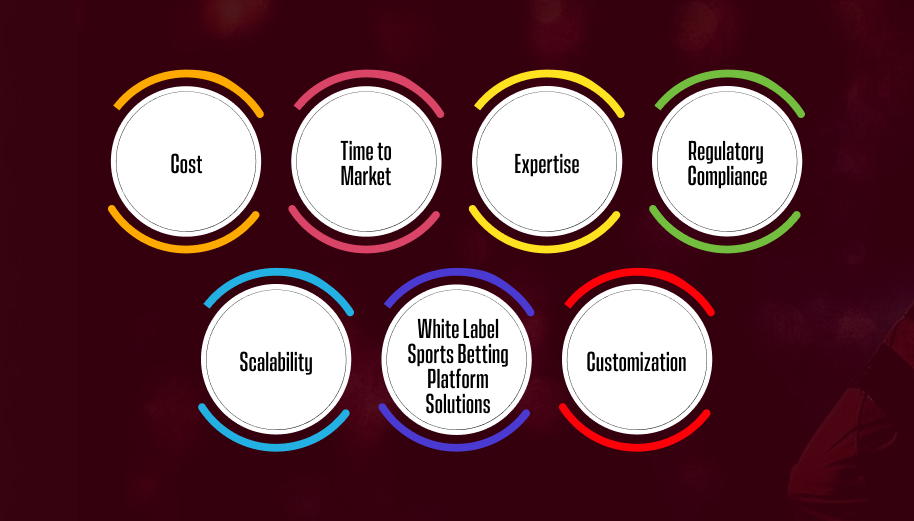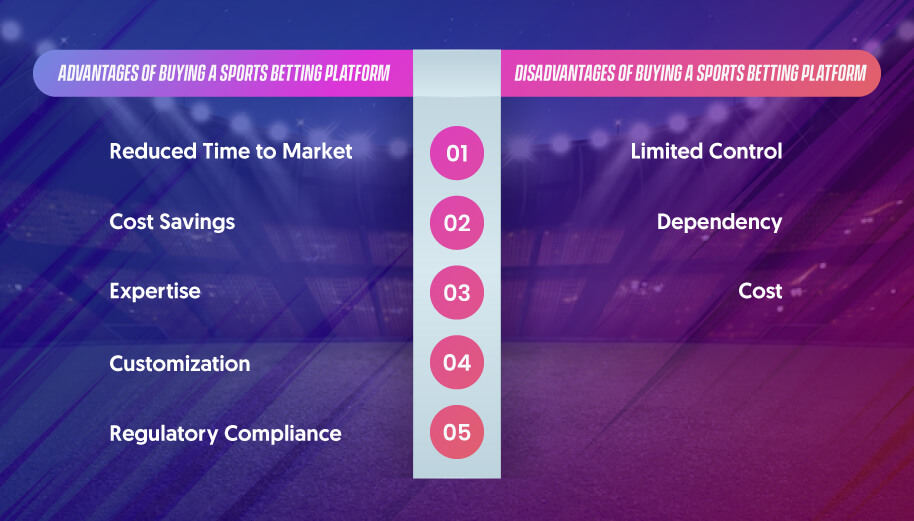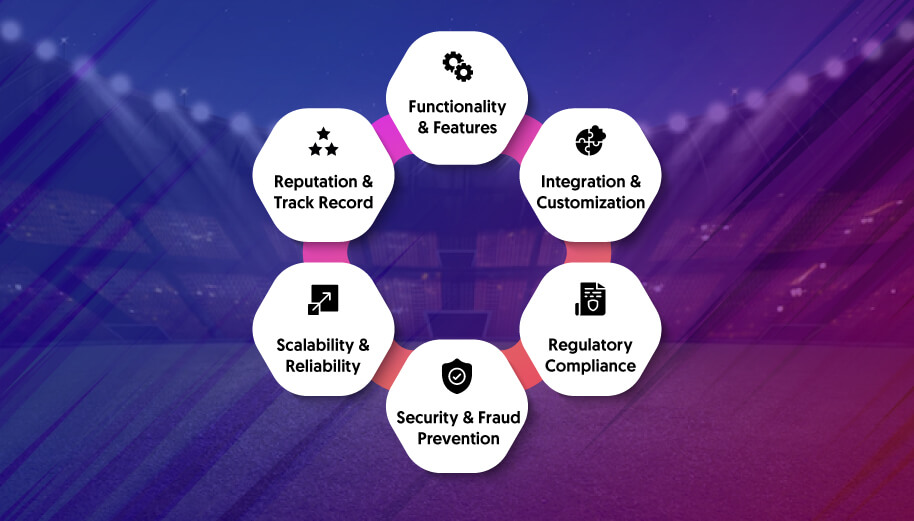TABLE OF CONTENTS
- 1. Introduction to the Online Sports Betting Industry and the Need for a Sports Betting Platform
- 2. White Label Sports Betting Platform Solutions
- 3. Building a Sports Betting Platform: Factors to Consider
- 4. Buying a Sports Betting Platform: Advantages and Disadvantages
- 5. Evaluating Sports Betting Software Providers: Key Considerations
- 6. Building or Buying a Sports Betting Platform: Which Makes More Profit?
- 7. Building or Buying a Sports Betting Platform: What to Choose?
- 8. Is Building a Sports Betting App Necessary?
- 9. Making the Right Decision for Your Business with iGamingbook
- 10. FAQs

The online sports betting industry has grown tremendously over the past few years, driven by advancements in technology and increased consumer demand. As a result, entrepreneurs and business owners are constantly looking for ways to enter this lucrative market, and one of the most critical decisions they face is whether to build a sports betting platform from scratch or buy a ready-to-launch sports betting platform from a white label sports betting software provider.
In this blog, we will explore the various factors that entrepreneurs and business owners should consider when deciding between building or buying a sports betting platform. While both options have their advantages and disadvantages, we will be making a case for buying a sports betting platform instead of building one.
We will begin by providing an answer to this common question “is sports betting profitable?” and why having a sports betting platform is essential for businesses looking to enter this market. Then, we will delve into the factors that businesses should consider when building a sports betting platform, including the technical skills and resources required, the time and cost involved, and the potential risks associated with building a custom platform.
Introduction to the Online Sports Betting Industry and the Need for a Sports Betting Platform
The online sports betting industry has become increasingly popular, with many entrepreneurs and businesses looking to enter the market. The industry is expected to continue growing, with the global online gambling market projected to reach $127.3 billion by 2027.
Advancements in technology have led to an increase in online sports betting platforms, making it easier for consumers to place bets on their favorite sports teams and events. As a result, having a sports betting platform is essential for businesses looking to enter this market.
The online sports betting industry is highly competitive although there are pros and cons of gambling. Having a sports betting platform can give businesses a competitive edge. A sports betting platform provides businesses with the ability to offer a wide range of sports betting options to their customers, including live betting, in-play betting, and pre-match betting.
In addition, a sports betting platform allows businesses to customize their offerings to meet the unique needs of their customers. This includes the ability to offer promotions, bonuses, and loyalty programs to their customers.
The demand for sports betting platforms has increased in recent years, driven by the growing popularity of online sports betting. However, building a sports betting platform from scratch can be a challenging and time-consuming process. This is where white label sports betting software providers come in.
White Label Sports Betting Platform Solutions
Building a Sports Betting Platform: Factors to Consider


Cost
One of the most significant factors to consider when building a sports betting platform is cost. Building a custom platform from scratch can be expensive, with costs running into the hundreds of thousands of dollars. This includes hiring a team of developers, designers, and project managers to oversee the development process. In addition to the initial development costs, businesses must also consider ongoing maintenance and support costs. This includes server hosting, software updates, and technical support.

Time to Market
Another important factor to consider is time to market. Building a custom sports betting platform from scratch can take several months, if not years, to develop and launch. This is a significant time investment, and businesses must consider the opportunity cost of delaying their entry into the market. In contrast, a white label sports betting platform can be launched in a matter of weeks, allowing businesses to enter the market quickly and gain a competitive advantage.

Expertise
Building a sports betting platform from scratch requires a high level of expertise in software development, design, and project management. Businesses must either have an internal team with the required expertise or hire an external team to develop the platform. If a business does not have an internal team with the required expertise, hiring an external team can be expensive and time-consuming. Furthermore, businesses must ensure that the team they hire has experience in developing sports betting platforms specifically.

Regulatory Compliance
Regulatory compliance is a critical factor to consider when building a sports betting platform. Online sports betting is a heavily regulated industry, with laws and regulations varying by jurisdiction. Businesses must ensure that their platform complies with all applicable laws and regulations in their target markets. Compliance includes ensuring that the platform is secure, customer data is protected, and that the platform operates fairly and transparently.

Scalability
Scalability is another factor to consider when building a sports betting platform. The platform must be designed to handle a large volume of traffic, with the ability to scale up quickly as demand increases. Scalability includes ensuring that the platform is optimized for performance, with fast load times and minimal downtime. Furthermore, the platform must be designed to handle a large number of transactions, with the ability to process payments quickly and securely.

White Label Sports Betting Platform Solutions
Building a sports betting platform from scratch can be a challenging and time-consuming process, with several factors to consider. This is where white label sports betting platforms come in. A white label sports betting platform is a pre-built solution that businesses can customize to meet their specific needs. White label solutions offer several benefits over building a custom platform from scratch.

Reduced Time and Cost
One of the key benefits of a white label sports betting platform is the reduced time and cost involved in launching a platform. Building a custom platform from scratch can take several months and cost hundreds of thousands of dollars. In contrast, a white label sports betting platform can be launched in a matter of weeks and at a fraction of the cost.

Customization
White label sports betting platforms are highly customizable, allowing businesses to tailor their platform to meet their specific needs. This includes the ability to add custom branding, integrate with third-party software, and offer a wide range of betting options to customers.

Regulatory Compliance
White label sports betting platforms are designed to comply with all applicable laws and regulations in the target markets. This includes ensuring that the platform is secure, customer data is protected, and that the platform operates fairly and transparently.

Expertise
White label sports betting platforms are developed by teams with extensive experience in software development and sports betting. This ensures that the platform is optimized for performance and designed to meet the needs of businesses in the online sports betting industry. White label sports betting platform providers also offer ongoing support and maintenance, ensuring that the platform stays up-to-date with the latest industry standards and regulations.

Scalability
White label sports betting platforms are designed to be highly scalable, with the ability to handle a large volume of traffic and transactions. This includes ensuring that the platform is optimized for performance, with fast load times and minimal downtime.
Buying a Sports Betting Platform: Advantages and Disadvantages

Advantages of buying a sports betting platform
Reduced Time to Market
Buying a sports betting platform offers a significant advantage in terms of time to market. Ready to launch sports betting platforms allow businesses to enter the market quickly and with minimal risk. By choosing a white label sports betting platform, businesses can avoid the lengthy process of developing and testing a custom platform from scratch. Instead, they can focus on launching their sports betting business and acquiring customers.
Cost Savings
Developing a sports betting platform from scratch can be expensive. It requires significant investment in terms of time, resources, and expertise. By buying a sports betting platform, businesses can save on development costs and get a return on investment faster. Additionally, white label sports betting platforms offer subscription-based pricing models, making it easier for businesses to manage their cash flow.
Expertise
Buying a sports betting platform provides businesses access to the expertise of the white label sports betting software provider. The provider has experience in developing sports betting platforms, which means they understand the intricacies of the industry. This expertise can help businesses avoid common mistakes and ensure regulatory compliance.
Customization
White label sports betting platforms offer businesses the opportunity to customize the platform to suit their specific needs. This includes customizing the user interface, integrating third-party applications, and adding new features. This level of customization allows businesses to create a unique brand identity and stand out from the competition.
Regulatory Compliance
Sports betting is a heavily regulated industry. White label sports betting software providers have a deep understanding of the regulatory landscape and can ensure compliance with local laws and regulations. This saves businesses the time and effort of researching and implementing regulatory requirements themselves.
Disadvantages of buying a sports betting platform
Limited Control
Buying a sports betting platform means giving up some control over the platform. While white label sports betting software providers offer a high level of customization, businesses must work within the limits of the platform. They cannot make significant changes to the underlying architecture or code, which can limit their ability to differentiate themselves from competitors.
Dependency
Buying a sports betting platform means businesses become dependent on the white label sports betting software provider. This includes relying on the provider for ongoing maintenance and support, software updates, and security. Businesses must ensure that they have a solid contractual agreement in place with the provider to avoid potential issues.
Cost
While buying a sports betting platform can save businesses money in terms of development costs, it still represents a significant investment. Businesses must pay for the platform, ongoing support, and maintenance. Additionally, white label sports betting platforms may charge a commission on bets placed on the platform, which can reduce profit margins. Thus this makes it one of the main reasons for the disadvantages of betting on the platform.
Evaluating Sports Betting Software Providers: Key Considerations

Reputation and Track Record
The first consideration when evaluating sports betting software providers is their reputation and track record. Look for providers with a proven track record of success in the industry. This includes a history of delivering high-quality software that is reliable, scalable, and secure. Additionally, look for providers that have a reputation for providing excellent customer service and support.
Functionality and Features
The next consideration is the functionality and features offered by the sports betting software provider. Evaluate the platform's user interface and user experience, as well as the range of betting options and markets available. Consider whether the platform supports live betting, in-play betting, and mobile betting. Look for features such as cash-out options, customizable odds, and player tracking.
Integration and Customization
Sports betting software providers should offer a high level of integration and customization. Look for providers that offer easy integration with third-party applications, such as payment gateways, marketing automation tools, and CRM systems. Additionally, look for providers that offer customization options, such as white labeling, branding, and custom themes.
Regulatory Compliance
Regulatory compliance is critical in the online sports betting industry. Look for sports betting software providers that have a deep understanding of the regulatory landscape and can ensure compliance with local laws and regulations. Providers should also have a proven track record of working with regulators and obtaining necessary licenses and certifications.
Security and Fraud Prevention
Sports betting platforms are high-risk targets for cybercriminals. Look for providers that offer robust security features, such as SSL encryption, DDoS protection, and two-factor authentication. Additionally, providers should have comprehensive fraud prevention measures in place, such as risk management tools and anti-fraud algorithms.
Scalability and Reliability
Finally, evaluate the scalability and reliability of the sports betting software provider. The platform should be able to handle high traffic volumes and maintain a high level of uptime. Additionally, the provider should offer disaster recovery and business continuity plans to ensure the platform is always available to users.
Making the Right Decision for Your Business
When considering buying a sports betting platform, iGamingBook is the perfect sports betting software provider. With a proven track record of delivering high-quality, white label sports betting software, iGamingBook provides businesses with a ready to launch sports betting platform that is reliable, scalable, and secure.
iGamingBook offers a range of features and functionality, including live betting, in-play betting, and mobile betting. Additionally, businesses can take advantage of iGamingBook’s comprehensive customization options, including white labeling, branding, and custom themes.
iGamingBook is committed to regulatory compliance and has a deep understanding of the regulatory landscape in various jurisdictions. The platform is designed to ensure compliance with local laws and regulations and provides ongoing support to maintain compliance.
Last Words
In conclusion, choosing whether to build or buy a sports betting platform is a significant decision that requires careful consideration. While building a platform may seem like a more attractive option at first, it comes with significant challenges, including high costs, longer development timelines, and the need for a highly skilled team. On the other hand, buying a ready-to-launch sports betting platform offers numerous advantages, including lower costs, faster time to market, and access to a pre-existing customer base.
It is important to choose right sports betting software provider by evaluating key factors such as their reputation, experience, scalability, and customization options. iGamingBook stands out as an excellent option for businesses looking to buy a sports betting platform due to their cutting-edge technology, extensive industry experience, and exceptional customer support.
In today’s highly competitive online sports betting industry, having a reliable and effective sports betting platform is critical to success. By choosing to buy a sports betting platform from a reputable provider like iGamingBook, businesses can access a top-quality platform without the need for significant upfront costs or long development timelines. Ultimately, the decision to build or buy a sports betting platform will depend on a variety of factors unique to each business, but for many, buying a ready-to-launch platform is the most sensible choice.
FAQs
A white label sports betting platform is a pre-built solution that can be customized and rebranded for specific businesses, allowing them to launch a sports betting platform without developing it from scratch.
Buying a sports betting platform offers numerous advantages, including lower costs, faster time to market, access to a pre-existing customer base, and the ability to focus on core business activities rather than development.
When evaluating sports betting software providers, it's essential to consider factors such as reputation, experience, scalability, customization options, and customer support.
iGamingBook offers cutting-edge technology, extensive industry experience, and exceptional customer support, making them an excellent option for businesses looking to buy a sports betting platform.
Sources:
- https://www.investopedia.com/terms/w/white-label-product.asp
- https://www.techopedia.com/definition/24401/white-label



